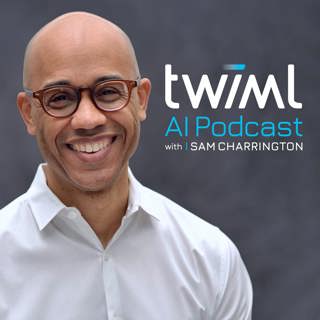
How Machine Learning Powers On-Demand Logistics at Doordash with Gary Ren - #405
Today we’re joined by Gary Ren, a machine learning engineer for the logistics team at DoorDash. In our conversation, we explore how machine learning powers the entire logistics ecosystem. We discuss the stages of their “marketplace,” and how using ML for optimized route planning and matching affects consumers, dashers, and merchants. We also talk through how they use traditional mathematics, classical machine learning, potential use cases for reinforcement learning frameworks, and challenges to implementing these explorations. The complete show notes for this episode can be found at twimlai.com/go/405! Check out our upcoming event at twimlai.com/twimlfest
31 Aug 202043min

Machine Learning as a Software Engineering Discipline with Dillon Erb - #404
Today we’re joined by Dillon Erb, Co-founder & CEO of Paperspace. We’ve followed Paperspace since their origins offering GPU-enabled compute resources to data scientists and machine learning developers, to the release of their Jupyter-based Gradient service. Our conversation with Dillon centered on the challenges that organizations face building and scaling repeatable machine learning workflows, and how they’ve done this in their own platform by applying time-tested software engineering practices. We also discuss the importance of reproducibility in production machine learning pipelines, how the processes and tools of software engineering map to the machine learning workflow, and technical issues that ML teams run into when trying to scale the ML workflow. The complete show notes for this episode can be found at twimlai.com/go/404.
27 Aug 202044min

AI and the Responsible Data Economy with Dawn Song - #403
Today we’re joined by Professor of Computer Science at UC Berkeley, Dawn Song. Dawn’s research is centered at the intersection of AI, deep learning, security, and privacy. She’s currently focused on bringing these disciplines together with her startup, Oasis Labs. In our conversation, we explore their goals of building a ‘platform for a responsible data economy,’ which would combine techniques like differential privacy, blockchain, and homomorphic encryption. The platform would give consumers more control of their data, and enable businesses to better utilize data in a privacy-preserving and responsible way. We also discuss how to privatize and anonymize data in language models like GPT-3, real-world examples of adversarial attacks and how to train against them, her work on program synthesis to get towards AGI, and her work on privatizing coronavirus contact tracing data. The complete show notes for this episode can be found twimlai.com/go/403.
24 Aug 202053min

Relational, Object-Centric Agents for Completing Simulated Household Tasks with Wilka Carvalho - #402
Today we’re joined by Wilka Carvalho, a PhD student at the University of Michigan, Ann Arbor. In our conversation, we focus on his paper ‘ROMA: A Relational, Object-Model Learning Agent for Sample-Efficient Reinforcement Learning.’ In the paper, Wilka explores the challenge of object interaction tasks, focusing on every day, in-home functions. We discuss how he’s addressing the challenge of ‘object-interaction’ tasks, the biggest obstacles he’s run into along the way.
20 Aug 202041min

Model Explainability Forum - #401
Today we bring you the latest Discussion Series: The Model Explainability Forum. Our group of experts and researchers explore the current state of explainability and discuss the key emerging ideas shaping the field. Each guest shares their unique perspective and contributions to thinking about model explainability in a practical way. We explore concepts like stakeholder-driven explainability, adversarial attacks on explainability methods, counterfactual explanations, legal and policy implications, and more.
17 Aug 20201h 27min

What NLP Tells Us About COVID-19 and Mental Health with Johannes Eichstaedt - #400
Today we’re joined by Johannes Eichstaedt, an Assistant Professor of Psychology at Stanford University. In our conversation, we explore how Johannes applies his physics background to a career as a computational social scientist, some of the major patterns in the data that emerged over the first few months of lockdown, including mental health, social norms, and political patterns. We also explore how Johannes built the process, and the techniques he’s using to collect, sift through, and understand the da
13 Aug 202058min

Human-AI Collaboration for Creativity with Devi Parikh - #399
Today we’re joined by Devi Parikh, Associate Professor at the School of Interactive Computing at Georgia Tech, and research scientist at Facebook AI Research (FAIR). In our conversation, we touch on Devi’s definition of creativity, explore multiple ways that AI could impact the creative process for artists, and help humans become more creative. We investigate tools like casual creator for preference prediction, neuro-symbolic generative art, and visual journaling.
10 Aug 202044min

Neural Augmentation for Wireless Communication with Max Welling - #398
Today we’re joined by Max Welling, Vice President of Technologies at Qualcomm Netherlands, and Professor at the University of Amsterdam. In our conversation, we explore Max’s work in neural augmentation, and how it’s being deployed. We also discuss his work with federated learning and incorporating the technology on devices to give users more control over the privacy of their personal data. Max also shares his thoughts on quantum mechanics and the future of quantum neural networks for chip design.
6 Aug 202048min






















